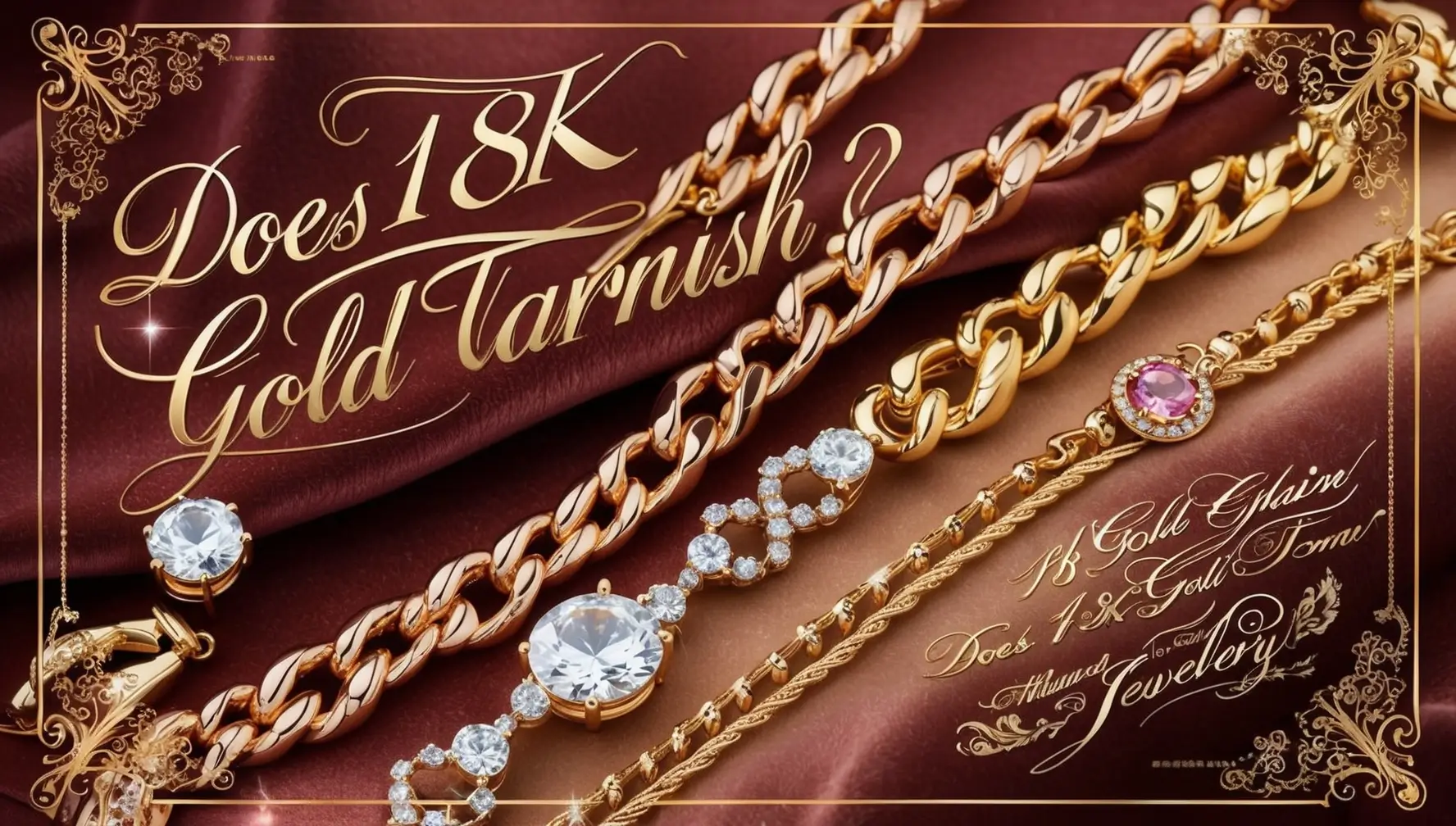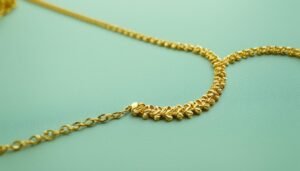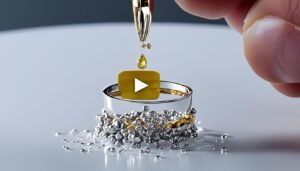When it comes to gold jewelry, there are many misconceptions and myths surrounding its care and maintenance.
One of the most common questions asked by jewelry enthusiasts is whether 18K gold tarnishes.
The answer to this question is not as straightforward as one might think, and requires a closer look into the science of jewelry oxidation and the various factors that contribute to tarnish formation.
Key Takeaways about Does 18K Gold Tarnish
- “Does 18K gold tarnish?” explores the truth about gold jewelry care and maintenance.
- 18K gold is an alloy comprising 75% pure gold and 25% other metals, making it a high-quality and durable choice for jewelry.
- Tarnish occurs through oxidation when metals react with elements in the environment, leading to a dull or discolored surface.
- Factors that contribute to tarnishing on 18K gold include exposure to air, moisture, chemicals, high humidity, and improper storage.
- Proper care and maintenance, such as regular cleaning, avoiding harsh chemicals, and storing jewelry correctly, can help prevent and minimize tarnishing.
Understanding Gold Purity: What is 18K Gold?
Gold purity is an essential aspect of determining the quality of gold used in jewelry. It refers to the amount of pure gold present in a piece relative to other metals or alloys.
18K gold is an alloy comprising 75% pure gold and 25% other metal(s), commonly copper, silver, or zinc. The term “K” stands for karat, a unit of measuring the purity of gold, with 24K being pure gold. Thus, 18K gold is often regarded as high-quality jewelry that combines the durability of alloys with the regal shine of pure gold.
This type of gold is a popular choice for jewelry production as it is strong enough to withstand daily wear and tear while still being affordable.
Depending on the other metals used to create the alloy, 18K gold can come in various hues such as yellow, white, and rose gold. The different colors are achieved by adding specific metals in different amounts to the alloy.
The Science Behind Tarnish
Before we dive into the topic of gold tarnish, it’s essential to understand the science behind it. Tarnish occurs when a metal undergoes a chemical reaction with oxygen, sulfur, or other elements in its environment. This reaction, known as oxidation, causes the metal’s top layer to become dull, discolored, or corroded.
During oxidation, a metal’s electrons lose energy, which leads to the formation of a new compound. This new compound is what we refer to as tarnish. Gold, like many other metals, is susceptible to tarnish under specific conditions.
| Oxidation Factors | Effect on Tarnishing |
|---|---|
| Environmental exposure (moisture, humidity, air pollution) | Accelerates tarnish formation |
| Chemical exposure (cleaning agents, perfumes, lotions) | Triggers tarnish formation |
| Direct skin contact (sweat, oils, acidic substances) | Speeds up tarnish formation |
As you can see, various factors contribute to tarnish formation on gold jewelry. Understanding these factors can help you take proper care of your 18K gold jewelry and prevent tarnishing.
Factors That Contribute to Tarnishing
While 18K gold is less prone to tarnish than its lower-karat counterparts, it is not completely immune to the effects of environmental exposure and chemical reactions.
Here are some of the key factors that can contribute to tarnishing in your gold jewelry:
| Factor | Description |
|---|---|
| Exposure to Air and Moisture | Gold can react with oxygen and water vapor in the air, leading to tarnish formation over time. |
| Chemical Exposure | Exposure to chemicals such as perfume, lotion, and cleaning products can cause tarnish to form on gold jewelry. |
| High Humidity | High levels of humidity can increase the rate of tarnish formation on your gold jewelry. |
| Poor Storage | Storing your gold jewelry in humid or non-ventilated areas can increase the risk of tarnish formation. It is best to store your jewelry in a dry, cool place. |
| Improper Cleaning | Using harsh chemicals or abrasive materials to clean your gold jewelry can erode the surface and lead to tarnish formation. |
It’s important to note that these factors can vary in their impact from person to person depending on individual body chemistry, lifestyle, and the specific environment in which the jewelry is worn and stored.
Does 18K Gold Tarnish?
Many people assume that gold jewelry, especially 18K gold, is immune to tarnish. However, this is not entirely true. While pure gold itself does not tarnish, other metals and alloys used to create gold jewelry can react with environmental factors and cause tarnishing.
So, does 18K gold tarnish? The answer is yes, it can. But the degree and speed of tarnishing depend on various factors, including the metal composition, care and maintenance, and exposure to environmental conditions.
While 18K gold contains a high percentage of pure gold, it is still mixed with other metals such as copper, silver, or palladium to increase its durability and strength. These metals can react with oxygen, sulfur, or moisture in the air, causing a chemical reaction that leads to tarnishing.
However, the rate of tarnishing on 18K gold is typically slower than on lower-carat gold alloys such as 14K or 10K. This is because the higher gold content in 18K gold makes it less reactive to environmental factors.
Factors That Affect Tarnishing on 18K Gold
| Factor | Explanation |
|---|---|
| Exposure to air and moisture | When 18K gold jewelry is exposed to air and moisture, such as sweat or humidity, it can accelerate the oxidation process and cause discoloration or blackening. |
| Chemical exposure | Certain chemicals, such as chlorine or bleach, can react with metals in 18K gold and cause tarnishing or even corrosion. It is important to avoid exposing gold jewelry to harsh chemicals or cleaning solutions. |
| Skin pH | The pH level of your skin can affect the rate of tarnishing on gold jewelry. Higher acidity levels can accelerate the oxidation process and cause faster tarnishing. |
| Improper care and storage | Without proper cleaning and storage, 18K gold jewelry can become dull or tarnished over time. It is recommended to clean the jewelry regularly with mild soap and store it in a dry, airtight container. |
Therefore, while 18K gold can tarnish, it is important to note that it is not inevitable. With proper care and maintenance, you can keep your gold jewelry shining and looking new for years to come.
Preventing Tarnish: Best Practices for Gold Jewelry Care
Proper care and maintenance are essential for keeping your 18K gold jewelry looking its best. Here are some best practices for preventing tarnish:
- Store your jewelry properly: Keep your 18K gold jewelry stored in a clean, dry place away from direct sunlight and moisture. Consider investing in a jewelry box or pouch to protect your pieces.
- Wear your jewelry with care: Avoid wearing your 18K gold jewelry while swimming, showering, or engaging in any strenuous activities. This can help prevent exposure to sweat, chlorine, and other chemicals that can tarnish the metal.
- Clean regularly: Regular cleaning can help keep your 18K gold jewelry free from dirt and oil that can lead to tarnishing. Use a soft-bristled brush and mild soap to clean your pieces or consider using a specialized jewelry cleaning solution.
- Handle with care: Avoid handling your 18K gold jewelry with dirty or oily hands, and try not to touch the metal more than necessary. This can help prevent the transfer of oils and other substances that can cause tarnish.
- Take off your jewelry at night: Removing your 18K gold jewelry before bed can help prevent exposure to oils and other substances that can lead to tarnish formation. Plus, it can help prevent damage or breakage while you sleep.
By following these best practices for gold jewelry care, you can help ensure that your 18K gold pieces continue to shine bright for years to come.
Polishing and Restoring Tarnished Gold Jewelry
Even with the best care, gold jewelry can still show signs of tarnish over time. Fortunately, there are several methods for polishing and restoring tarnished gold jewelry to its original shine.
Note: If you have delicate or valuable pieces, it’s best to seek professional assistance rather than attempting to clean them yourself.
| Method | Steps |
|---|---|
| Soap and Water |
|
| Lemon Juice and Baking Soda |
|
| Commercial Jewelry Cleaner |
|
“Remember to always handle your gold jewelry with care, and avoid using harsh chemicals or abrasive materials that can scratch or damage the metal.”
If these methods don’t work, it may be time to consider having your gold jewelry professionally cleaned and restored. A jeweler can use specialized equipment and techniques to remove even stubborn tarnish and restore your jewelry to its original glory.
Other Common Questions About Gold Tarnish
While the question of whether 18K gold tarnishes is a common one, there are many other related inquiries that people have about gold jewelry and its care.
Here are some of the most frequently asked questions:
- Can gold-plated jewelry tarnish?
- Does rose gold tarnish?
- What causes white gold to tarnish?
- Is it safe to clean gold jewelry with vinegar?
- How often should I clean my gold jewelry?
Each of these questions deserves a thoughtful and informative answer, and we will do our best to provide them throughout this article.
Debunking Gold Tarnish Myths
There are plenty of myths and misconceptions surrounding gold tarnish that can make it difficult to know how to care for your jewelry properly. Here are a few of the most common myths debunked:
- Myth: All gold jewelry will eventually tarnish.
- Truth: While it is true that all metals can be susceptible to tarnish, proper care and maintenance can significantly slow down the tarnishing process for gold jewelry.
- Myth: You can’t wear gold jewelry in the shower or when swimming.
- Truth: While it’s true that harsh chemicals and exposure to water can contribute to tarnishing, wearing gold jewelry in the shower or while swimming is generally safe as long as you properly dry your jewelry after exposure to water.
“Wearing gold jewelry in the shower or while swimming is generally safe as long as you properly dry your jewelry after exposure to water.”
- Myth: Removing gold jewelry before bed can prevent tarnish.
- Truth: While removing jewelry before bed can reduce wear and tear, it won’t necessarily prevent tarnish from forming. Proper care and maintenance, such as regular cleaning and proper storage, are key to preserving your gold jewelry’s shine.
- Myth: You can clean gold jewelry with toothpaste.
- Truth: While toothpaste can be abrasive and may remove surface dirt, it is not a recommended cleaner for gold jewelry. Toothpaste can scratch the surface of gold and damage delicate gemstones, leading to more harm than good.
By understanding the truths behind common gold tarnish myths, you can take the necessary steps to properly care for your jewelry and keep it looking its best for years to come.
Caring for Your 18K Gold Jewelry: Expert Tips and Advice
Now that you understand the science behind tarnish and the factors that contribute to it, it’s time to focus on the best practices for caring for your 18K gold jewelry.
Here are some expert tips and advice for keeping your gold jewelry looking shiny and new:
- Remove jewelry before any physical activity. This includes exercise, household chores, and any other activities that could expose your jewelry to sweat, moisture, or chemicals.
- Store your jewelry properly. Keep your jewelry in a dry, cool place, away from direct sunlight, heat, or humidity. Consider using a jewelry box or a soft cloth pouch to prevent scratches and dust accumulation.
- Clean your jewelry regularly. Use a mild soap, warm water, and a soft-bristled brush to gently clean your jewelry. Avoid using harsh chemicals or abrasive materials that could damage the surface. Don’t forget to dry your jewelry thoroughly before storing it.
- Get regular maintenance check-ups. Visit your jeweler at least once a year for a professional cleaning and inspection of your jewelry. They can also assess any possible damage or wear and tear and provide you with recommendations for repair or restoration.
- Be cautious with DIY methods. While there are many DIY methods for cleaning and polishing gold jewelry, some of them might do more harm than good. Avoid using toothpaste, baking soda, or other household products that could scratch or damage your jewelry. Stick to professional cleaning methods or consult with your jeweler for safe alternatives.
By following these simple tips, you can ensure that your 18K gold jewelry stays beautiful and tarnish-free for a long time.
FAQ about Does 18K Gold Tarnish?
Here are some frequently asked questions about 18K gold tarnish:
Q: Will 18K gold tarnish over time?
A: Yes, 18K gold can tarnish over time due to exposure to environmental factors and improper care. However, it is less likely to tarnish compared to lower karat gold.
Q: How can I prevent my 18K gold jewelry from tarnishing?
A: To prevent tarnishing, it is recommended to store your 18K gold jewelry in a cool, dry place, away from chemicals and other metals. Regular cleaning and maintenance can also help keep your jewelry in top condition.
Q: Can gold-plated jewelry tarnish?
A: Yes, gold-plated jewelry can tarnish over time as the plating wears off and exposes the base metal. It is important to follow proper care and maintenance practices to prolong the life of your gold-plated jewelry.
Q: Does rose gold tarnish?
A: Like all gold jewelry, rose gold can tarnish over time due to exposure to environmental factors and improper care. However, it is less likely to tarnish compared to lower karat gold.
Q: Can I restore tarnished 18K gold jewelry?
A: Yes, tarnished 18K gold jewelry can be restored through polishing and cleaning. However, it is important to seek professional assistance for valuable or delicate pieces to avoid causing damage.
Q: Is it safe to clean tarnished 18K gold jewelry with household products?
A: No, household products such as bleach or abrasive cleaners can damage 18K gold jewelry. It is recommended to use a mild soap and water solution, or seek professional cleaning services.
Resources and External Links
Here are some additional resources and external links that can help you understand more about 18K Gold and its properties:
Articles
- Does gold tarnish? | Tiffany & Co.
- Does Gold Tarnish? Bonus: How to Clean Gold! – Jewelry Jealousy
- Does Gold Tarnish? Causes, Prevention, and Cleaning Tips
- Does 18K Gold Tarnish? – preciousmetalinfo.com
- What Is 18K Gold? | The Look, Cost, & Durability of 18 Karat – Frugal Rings
These resources provide additional information and insights about 18K Gold and its properties.
Disclaimer
The information provided on this website and any related content is for informational purposes only and should not be considered as financial advice. It is not intended to substitute professional financial advice, nor does it constitute a recommendation to buy, sell, or invest in any financial product or asset.
All investment decisions and actions taken by individuals based on the information provided are at their own risk. Before making any financial decisions, individuals should consult with a qualified financial advisor or professional to assess their unique financial situation, risk tolerance, and investment goals.








